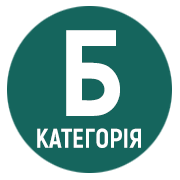RHETORICAL QUESTIONS IN DMYTRO ZAGUL’S POETIC DISCOURSE: EXPRESSIVENESS AND INTENTIONALITY
DOI:
https://doi.org/10.32782/2412-933X/2025-XXIV-21Keywords:
rhetorical question, syntactic expressema, poetic discourse, intentionality, dialogicity, author’s voice, addressee, idiolect, Dmytro ZagulAbstract
The article examines rhetorical questions viewed from the various standpoints: as universal linguistic units that differentiate from an interrogative sentence, but express an emotionally expressive affirmation/denial; as syntactic expressemes, the asymmetrical structure of which contributes to the enhancement of the aesthetic effect of poetic discourse, the expression of the intentional-semantic dominant of the statement, the individualization of the writer’s style, the creation of expressiveness, suggestiveness and sophistication of Ukrainian speech.Following the framework of Dmytro Zagul’s speech creation, this study distinguishes three models of rhetorical constructions, in particular: rhetorical questions serving as emotionally charged affirmations; rhetorical questions functioning as emotionally charged negations; rhetorical questions that encapsulate a broad spectrum of the author’s intentions, contributing to the expressiveness and emotional intensity of the poetic text. These rhetorical devices fulfill various communicative and pragmatic roles, such as activating the addressee’s attention, encouraging them to reflect and empathize, forming the dialogicity and emotionality of text communication, contributing to the expression of the author’s or the lyrical hero’s psycho-emotional state, and playing an important role in structuring the literary text. Through extensive illustrative examples, the article posits that rhetorical questions are pivotal markers of Zagul’s poetic idiolect, reflecting his linguistic mindset, worldview, and philosophical orientations.
References
Безпечний І. Теорія літератури. Торонто : Молода Україна, 1984. 304 с.
Білецький А.О. Про мову і мовознавство : навч. посібник для студентів філол. спец. вищ. навч. закладів. Київ : «АртЕк», 1997. 224 с.
Булаховський Л.А. Виникнення і розвиток літературних мов. Вибрані праці : у 5 т. Київ : Наукова думка, 1975. Т. : Загальне мовознавство. С. 321–470.
Ващенко В.С. Стилістичний синтаксис. Сучасна українська літературна мова: Стилістика / за ред. І.К. Білодіда. Київ : Наук. думка, 1973. С. 339‒464.
Єрмоленко С.Я. Експресивність. Українська мова: енциклопедія / редкол.: В.М. Русанівський та ін. Київ : Вид-во «Українська енциклопедія» ім. М.П. Бажана, 2000. С. 156‒157.
Загнітко А.П. Теоретична граматика української мови: Синтаксис : монографія. Донецьк : ДонНУ, 2001. 662 с.
Загул Д.Ю. Поезії / упоряд., вступ. ст. і прим. С.В. Далавурака та В.М. Лесина. Київ : Рад. письменник, 1990. 326 с.
Калашник В.С. Людина та образ у світі мови: вибрані статті. Харків : ХНУ ім. В. Каразіна, 2011. 368 с.
Кондратенко Н.В. Синтаксис українського модерністського і постмодерністського художнього дискурсу : монографія. Київ : Видавничий дім Дмитра Бураго, 2012. 328 с.
Франко З.Т. Риторичне питання. Українська мова. Енциклопедія / редкол.: В.М. Русанівський Київ : «Укр. енцикл.», 2000. С. 512‒513.
Шабат-Савка С.Т. Риторичні звертання як маркери поетичного ідіолекту Дмитра Загула. Вчені записки Таврійського національного університету імені В.І. Вернадського. Серія: Філологія. Журналістика. 2025. Том 36 (75). № 1. С. 82‒88.
Шабат-Савка С.Т. Українськомовний питальний дискурс : монографія. Чернівці : Чернівец. нац. ун-т ім. Ю. Федьковича, 2019. 332 с.






